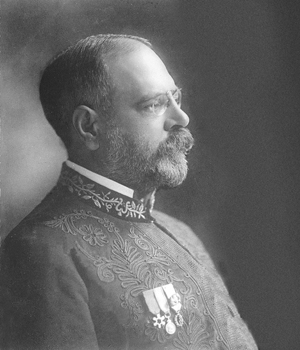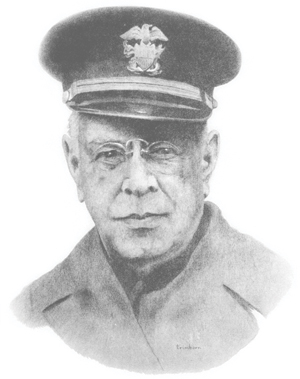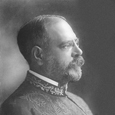 By the turn of the 20th century John Philip Sousa was one of the most famous musicians in the world. His brilliant and sophisticated marches, operettas, suites, songs, and transcriptions were well known and often performed, and he had become an icon. Newspapers and magazines often printed photographs and caricatures of him, and more people could recognize him than the President of the United States. In every respect Sousa was a superstar. “Sousa was a public relations genius. He was very image-conscious [and] liked to be seen with other celebrities – there are pictures of him taken with Thomas Edison, Charlie Chaplin, Irving Berlin” amongst many others. “He subscribed to a clipping service that collected mentions about him from newspapers around the country [that] filled 40 scrapbooks. In short he was big news everywhere,” according to Keith Brion, a noted Sousa interpreter.
By the turn of the 20th century John Philip Sousa was one of the most famous musicians in the world. His brilliant and sophisticated marches, operettas, suites, songs, and transcriptions were well known and often performed, and he had become an icon. Newspapers and magazines often printed photographs and caricatures of him, and more people could recognize him than the President of the United States. In every respect Sousa was a superstar. “Sousa was a public relations genius. He was very image-conscious [and] liked to be seen with other celebrities – there are pictures of him taken with Thomas Edison, Charlie Chaplin, Irving Berlin” amongst many others. “He subscribed to a clipping service that collected mentions about him from newspapers around the country [that] filled 40 scrapbooks. In short he was big news everywhere,” according to Keith Brion, a noted Sousa interpreter.
The Rising Star
Sousa became the conductor of the Marine Band at age 26 and forged this group into a first-class ensemble. He increasingly wrote marches, and many became hits. In 1892 he left the Marines and formed a professional band that toured the United States, Europe, and elsewhere around the world. A part of his fame should be credited to the carefully crafted image he developed by sporting a full beard, wearing pince-nez spectacles, and always appearing in a resplendent uniform. His portrait was included on virtually all of his published music.
Sousa’s Country Calls
Soon after the United States entered W.W.I in April 1917 the Navy approached Sousa to take charge of music at the Great Lakes naval training center north of Chicago. He forthwith disbanded the Sousa Band and enlisted in the Navy as a Lieutenant, and in the next four years so many musicians enlisted to be in his band (including composer Vincent Yomans of later Broadway and Hollywood fame) that the band consistently had numbered 350 players. Through appearances in concert and parades at Liberty Loan Bond and Red Cross rallies or benefit concerts for Navy relief and recruiting programs, Sousa raised millions of dollars in support of the war effort.
 The Big Scoop
The Big Scoop
During a November 1917 performance of Romeo and Juliet at the Auditorium Theatre which Mr. and Mrs. Sousa attended, Sousa slipped out of the theater during an intermission and returned missing the beard he had worn since his days in the Marine Corps. Later when he returned to the base, word quickly spread throughout the ranks. A lieutenant exclaimed in amazement to a young Chicago Tribune reporter named Larry Lawrence, “Do you know that Commander Sousa has shaved off his beard? I just saw him and didn’t know him at first.”
Lawrence pleaded, “Don’t tell another soul,” because it was getting close to closing time for the next issue. Lawrence ducked into the office of a friendly officer, grabbed the telephone, and asked the switchboard officer to be connected to Sousa’s home.
In no time, Lawrence was talking to Mrs. Sousa and explained who he was. “I have just heard that the Commander shaved off his beard. Is this true?”
Mrs. Sousa said, “Yes he did. It’s true.”
“Do you know why?” Lawrence asked, almost holding his breath.
“Not exactly,” she replied.
“Did he do it to please you?”
“Well, yes, partly to please me I guess.”
“How do you like him clean shaven?”
“I think he’s more handsome,” she replied.
“Did he talk it over with you beforehand?” Lawrence asked.
“Well, yes. We have been talking about it for some time. He has wanted to shave but feared that he would look odd, I guess. He has had a beard since he was a young man.”
“Are you happy?” the reporter inquired.
“Yes, I think so.”
“Thank you!” Lawrence exclaimed as he hung up.
In a short time Lawrence had his city editor on the telephone. “I’ve got a world-shattering exclusive story.”
“Yes, what?”
“Sousa has shaved,” Lawrence shouted.
“Do you want to dictate a story?”
“Yes, get me Kent Sykes. Let me tell him all I know.” Sykes was one of Lawrence’s favorite rewrite men, , and he knew he would do a good job, look up Sousa’s history – things he had not had time to locate. Kent did a good, fast job and caught the home edition, scooping the world by more than an hour. Many years later, Lawrence retold this account of events in his “That Reminds Me” column in the Milwaukee Journal.
Sousa Meets the Press
After Lawrence broke the story, so many newspapermen swarmed around Sousa’s rehearsal hall that he held a press conference. A photographer from the Chicago Daily News took a photo for the final edition with the headline, “John Philip Sousa Minus Beard.” The caption below read, “Famous March King as He Appeared Today at Great Lakes Naval Training Station all Shaven and Shorn.” Sousa biographer Paul Bierley wrote that Sousa privately felt the need to identify with his youthful bandsmen and decided the beard had to go. To the press Sousa joked that by shaving off his beard he thought Germany would simply have to surrender as soon as Kaiser Wilhelm realized that a nation made up of men who were willing to make such a sacrifice could not be defeated. The effect of Sousa’s bold move endeared him to the 350 “Jackie” band members. Sousa became one of the boys. He looked younger and also marched, ate, and slept with them on tour. In following years he only had variations of a mustache and a goatee, usually just a mustache alone. On rare occasions he performed without any facial hair.
Sousa Lessons
All of the attention focused on Sousa evolved from his ability to promote himself to the public. Otherwise his beard would not have been headline news. Former Marine Frank Byrne has noted that Sousa admitted growing a beard in the first place to appear European, but later he shaved it off to appear younger. The lesson for everyone today is that one of the keys to success was to make everything about himself, his bands, musicians, and music into headline events. Sousa was a master at telling and supplementing an ongoing story. The context has certainly changed these days, but the lesson is still the same: Promote, publicize, program concerts to please as well as educate, and always consider what audience you will have. It may not be necessary to come clean in quite the way he did, but recall that Sousa realized he needed to evolve, and so do we all.






